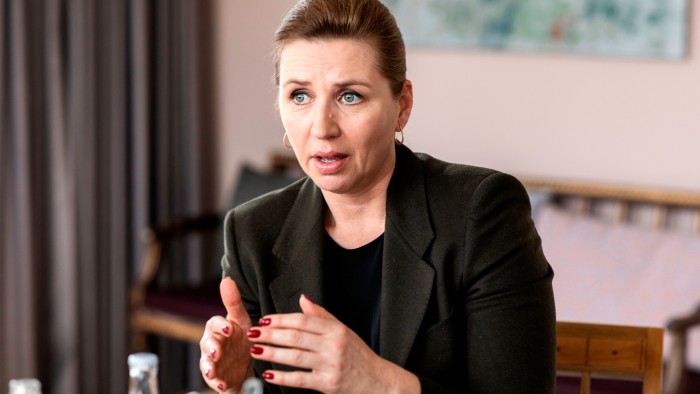Roula Khalaf, Editor of the FT, selects her favourite stories in this weekly newsletter.
Denmark will have to a rip up a five-year funding plan for defence only eight months after it was agreed, with the prime minister admitting her country will need to spend more because of growing European security risks.
The government struck a cross-party agreement in April to raise spending by DKr35bn ($5bn) between 2024 and 2028, enough to hit the Nato target of at least 2 per cent of the GDP.
Asked if that agreement was now out of date, Mette Frederiksen told the Financial Times: “I guess it is.”
Her comments are a demonstration of how quickly European governments are having to reassess their defence commitments with incoming US president Donald Trump determined to shift more of the burden on to European capitals while bringing a swift end to the war in Ukraine.
Nato members are discussing whether to raise the spending target to 3 per cent at their summit in June, with a shorter-term objective of 2.5 per cent.
From left: Alexander Stubb, president of Finland, UK Prime Minister Sir Keir Starmer and Mette Frederiksen, prime minister of Denmark in Tallinn, Estonia on Tuesday © Leon Neal/POOL/AFP/Getty Images
Speaking on Tuesday at a meeting in Tallinn, Estonia, of northern European countries that are members of the UK-led Joint Expeditionary Force, a defence grouping, Sweden’s Prime Minister Ulf Kristersson appeared to back the 3 per cent goal, saying “2.5 would honestly be too little”.
The 10 JEF member countries agreed this week that they would have to spend “well beyond 2 per cent of GDP”.
Frederiksen, one of the EU’s few remaining centre-left prime ministers, has become a Russia hawk and one of Ukraine’s staunchest supporters in Europe.
She said she intended “to spend as much as needed on defence and deterrence” because Russia would remain a threat to Europe even if the incoming Trump administration engineered a peace deal between Moscow and Kyiv next year.
“Maybe it will be an end to the war in Ukraine, but it will not be an end to Russia’s aggression,” she said.
Denmark has increased defence spending rapidly since 2022, up from 1.4 per cent of GDP to 2.4 per cent this year, including aid to Ukraine. It has provided €7bn in military aid to Kyiv, according to the Kiel Support Tracker, making it the second-biggest donor by share of GDP. By comparison, the UK has provided €10bn.
Frederiksen declined to commit to a numerical target on Danish defence expenditure.
“I prefer we do it the other way around — that we agree in Nato’s what is needed and capabilities,” she said. But she added: “We are really in a hurry and we have to be very clear that we have to scale up and we have to speed up.”
Frederiksen earlier this month dropped a long-standing Danish government objection to common debt issuance by the EU to help fund procurement and defence industrial production.
Officials in Brussels are also drawing up plans for an intergovernmental special-purpose vehicle that could issue loans to governments and industry to help the EU and associated countries re-arm.
“We will be very open minded in all discussions because I have never thought that this war is primarily a question about Ukraine. I see this as a question about Russia,” she said. “They will continue to attack European countries in different ways and different levels, and therefore we have to be able to defend ourselves.”
However, amid concern in some capitals about potential duplication of roles, she also made clear it was not up to the EU to make “strategic decisions” on defence.
“It is within Nato that we take the strategic decisions, what to buy, where to buy from, and what is needed to ensure that Nato is able, on deterrence and defence, to ensure that this war will not grow bigger than it is already now. And it is the role of the EU to deliver on what is needed.”
Frederiksen appealed to other Ukraine supporters to deliver quickly the weapons they promised earlier this year, particularly air defences, and to follow Denmark’s lead in channelling funds directly to Ukrainian defence manufacturers.
“I have seen with my own eyes what they are capable of doing in Ukraine. They are producing much faster. And they can change production lines very easily because of the [proximity of] battlefield.”
Source link : http://www.bing.com/news/apiclick.aspx?ref=FexRss&aid=&tid=67628dd4a93a43f1811713fa3f880e6a&url=https%3A%2F%2Fwww.ft.com%2Fcontent%2F9744ac4f-57a7-4934-b85e-004fbfda2e38&c=12646620870485314152&mkt=de-de
Author :
Publish date : 2024-12-17 21:00:00
Copyright for syndicated content belongs to the linked Source.
